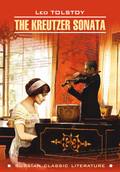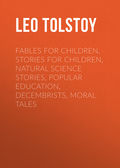
Лев Толстой
Where Love is There God is Also
But here Avdyeitch saw that an old apple woman had stopped in front of his window. She carried a basket with apples. Only a few were left, as she had evidently sold them nearly all out; and over her shoulder she had a bag full of chips. She must have gathered them up in some new building, and was on her way home. One could see that the bag was heavy on her shoulder; she tried to shift it to the other shoulder. So she lowered the bag on the sidewalk, stood the basket with the apples on a little post, and began to shake down the splinters in the bag. And while she was shaking her bag, a little boy in a torn cap came along, picked up an apple from the basket, and was about to make his escape; but the old woman noticed it, turned around, and caught the youngster by his sleeve. The little boy began to struggle, tried to tear himself away; but the old woman grasped him with both hands, knocked off his cap, and caught him by the hair.
The little boy was screaming, the old woman was scolding. Avdyeitch lost no time in putting away his awl; he threw it upon the floor, sprang to the door, – he even stumbled on the stairs, and dropped his spectacles, – and rushed out into the street.
The old woman was pulling the youngster by his hair, and was scolding and threatening to take him to the policeman; the youngster was defending himself, and denying the charge.
“I did not take it,” he said; “What are you licking me for? Let me go!”
Avdyeitch tried to separate them. He took the boy by his arm, and said: —
“Let him go, babushka; forgive him, for Christ's sake.”
“I will forgive him so that he won't forget it till the new broom grows. I am going to take the little villain to the police.”
Avdyeitch began to entreat the old woman: —
“Let him go, babushka,” he said, “he will never do it again. Let him go, for Christ's sake.”
The old woman let him loose; the boy started to run, but Avdyeitch kept him back.
“Ask the babushka's forgiveness,” he said, “and don't you ever do it again; I saw you take the apple.”
The boy burst into tears, and began to ask forgiveness.
“There now! that's right; and here's an apple for you.”
And Avdyeitch took an apple from the basket, and gave it to the boy.
“I will pay you for it, babushka,” he said to the old woman.
“You ruin them that way, the good-for-nothings,” said the old woman. “He ought to be treated so that he would remember it for a whole week.”
“Eh, babushka, babushka,” said Avdyeitch, “that is right according to our judgment, but not according to God's. If he is to be whipped for an apple, then what ought to be done to us for our sins?”
The old woman was silent.
And Avdyeitch told her the parable of the master who forgave a debtor all that he owed him, and how the debtor went and began to choke one who owed him.
The old woman listened, and the boy stood listening.
“God has commanded us to forgive,” said Avdyeitch, “else we, too, may not be forgiven. All should be forgiven, and the thoughtless especially.”
The old woman shook her head, and sighed.
“That's so,” said she; “but the trouble is that they are very much spoiled.”
“Then we who are older must teach them,” said Avdyeitch.
“That's just what I say,” remarked the old woman. “I myself have had seven of them, – only one daughter is left.”
And the old woman began to relate where and how she lived with her daughter, and how many grandchildren she had. “Here,” she says, “my strength is only so-so, and yet I have to work. I pity the youngsters – my grandchildren – but what nice children they are! No one gives me such a welcome as they do. Aksintka won't go to anyone but me. ‘Babushka, dear babushka, lovliest.’”
And the old woman grew quite sentimental.
“Of course, it is a childish trick. God be with him,” said she, pointing to the boy.
The woman was just about to lift the bag up on her shoulder, when the boy ran up, and said: —
“Let me carry it, babushka; it is on my way.”
The old woman nodded her head, and put the bag on the boy's back.
And side by side they passed along the street.
And the old woman even forgot to ask Avdyeitch to pay for the apple. Avdyeitch stood motionless, and kept gazing after them; and he heard them talking all the time as they walked away. After Avdyeitch saw them disappear, he returned to his room; he found his eye-glasses on the stairs, – they were not broken; he picked up his awl, and sat down to work again.
After working a little while, it grew darker, so that he could not see to sew; he saw the lamplighter passing by to light the street-lamps.
“It must be time to make a light,” he said to himself; so he got his little lamp ready, hung it up, and he took himself again to his work. He had one boot already finished; he turned it around, looked at it: “Well done.” He put away his tools, swept off the cuttings, cleared off the bristles and ends, took the lamp, set it on the table, and took down the Gospels from the shelf. He intended to open the book at the very place where he had yesterday put a piece of leather as a mark, but it happened to open at another place; and the moment Avdyeitch opened the Testament, he recollected his last night's dream. And as soon as he remembered it, it seemed as if he heard someone stepping about behind him. Avdyeitch looked around, and saw – there, in the dark corner, it seemed as if people were standing; he was at a loss to know who they were. And a voice whispered in his ear: —







